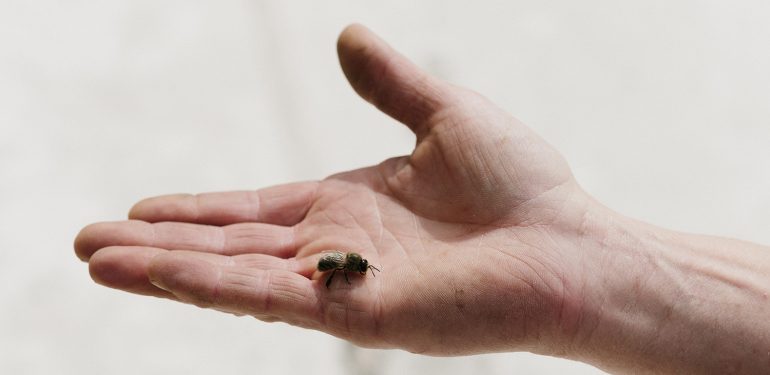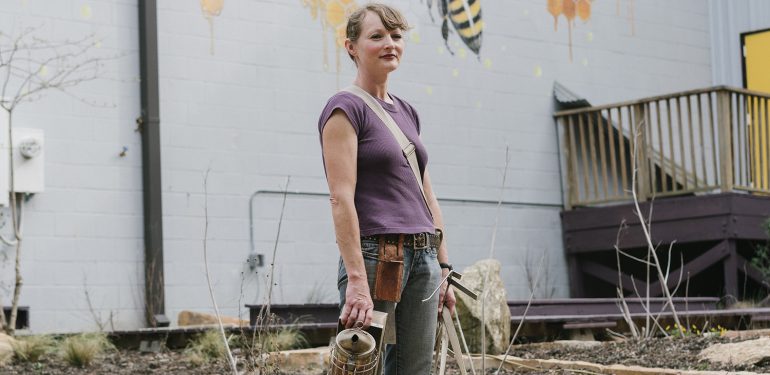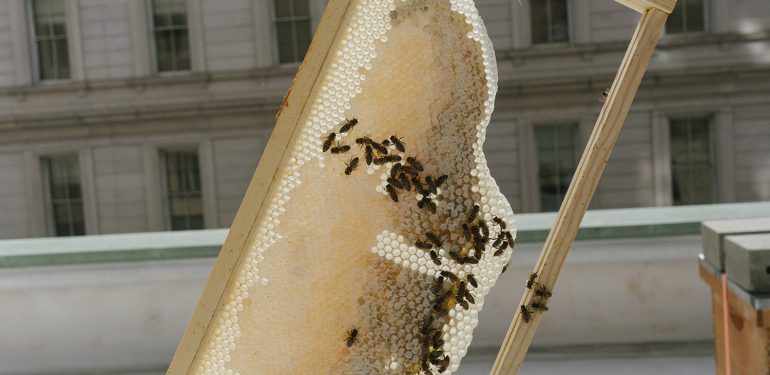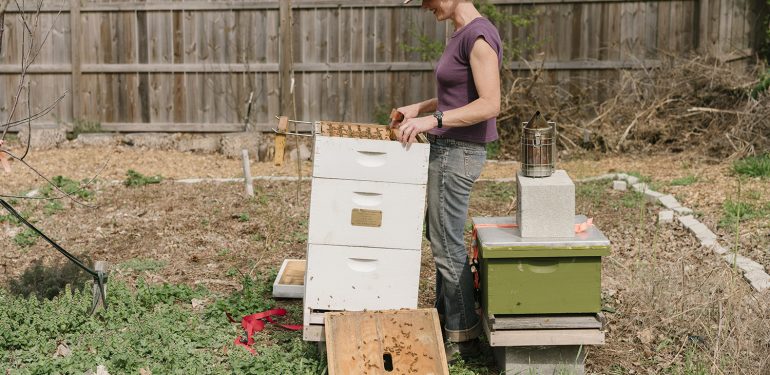
With a view to the west behind her, Alice Hinman inspects a hive on the roof of Clearscapes on West Martin Street.
by Hampton Williams Hofer
photographs by Peter Hoffman
Alice Hinman is a regular at many of Raleigh’s hottest spots: Kings, Centro, Garland, Standard Foods, Big Boss Brewing Company, Stanbury. She hits them all weekly, but she doesn’t use the door. Usually, she uses an extension ladder to climb onto the rooftops to check on the honeybees who live there. Thanks in part to Hinman, founder of the nonprofit urban bee sanctuary Apiopolis, Raleigh is a bee city. Under her care, as many as 6 million of the fuzzy pollinators – which play a vital role in sustaining our local ecosystem – are currently thriving in 60 colonies all over town.
The city offers its challenges, but also its benefits. Bees in cities, she found, actually can fare better than those in rural areas, because no matter what, cities have diverse nectar sources like potted plants and colorful flowers on display. Rural bees may struggle for nectar in agricultural areas that are cultivated with only a few crops. So with the city as her focus, Hinman tends to downtown bees, enabling them to do their important work of pollination.
She scoots around town in her silver Dodge Dakota, a ladder in the truck bed, a hat and veil on the seat beside her. “It’s quite different from their idyllic rural environment,” she says, “but I think we can affect positive change wherever we are.” It isn’t just the Raleigh honeybees that have benefitted from her efforts. Artists, brewers, bakers, saxophonists, photographers, and educators have come together to help Apiopolis’ cause, painting murals and making T-shirts and entertaining guests at bee events, none accepting any payment beyond hugs and jars of honey. With that, Hinman has helped weave a community.
With eight hives in her own yard in northeast Raleigh, Hinman also has a community of neighbors who appreciate her work and have embraced her use of an empty lot to keep even more colonies nearby. She also works as a beekeeper for hire, tending to bees beyond her own, and beyond Apiopolis’ downtown fleet. One client is Eliza Olander, for whom Hinman keeps 16 hives. The honey from Olander’s hives is bottled and sold, with all profits going to the Frankie Lemmon School, which provides education for special needs children. “Alice’s utter passion, her thirst for knowledge, and her striving to educate everyone about bees is not only contagious,” says Olander, “it’s exhilarating.”

Above: Hinman points to the queen bee among the workers while checking hives at Camden Street Learning Garden, shown below. Interfaith Food Shuttle created the garden for neighbors to grow their own food.
Buzz of interest
Hinman’s interest in bees began about seven years ago, when she started reading books about the insects, mostly because she liked honey. She enrolled in a Wake County beekeeping class and taught herself to be a natural beekeeper. “The bees … these remarkable, beautiful creatures,” she says, “as much as we need them, right now and because of what we’ve done, they need us.” The idea for Raleigh’s bee sanctuary was born after Hinman spent two years studying sustainable biodynamic beekeeping at a bee mecca in rural Virginia called Spikenard Farm Honeybee Sanctuary. She describes Spikenard as “magical,” a place overflowing with vigorous hives of bees that thrive in the pollinator gardens and fields planted with forage just for them. In contrast to commercial beekeeping practices aimed at maximizing production, the bees at Spikenard are revered, honored. Hinman decided to translate the philosophies of Spikenard to Raleigh’s urban environment.
When she was getting started in 2010, Hinman needed to raise money for her new urban bee sanctuary. She wanted to sell her honey, but she needed a place to do it. She emailed Craig Heffley, owner of Wine Authorities, to see if he’d sell it for her, and she brought him a jar to taste. Today, she sells almost all of the honey from her own hives at Wine Authorities, and uses 100 percent of the proceeds to buy bees for Apiopolis. It was over drinks with Heffley at Players’ Retreat that they came up with the name “Apiopolis” – a combination of the Italian ape for bee, and the Greek polis for city. Heffley, who describes Hinman as “a ‘roll up the sleeves and jump right in’ force of nature,” praises her proactive stance: “Most of us recognize that the decline of pollinators is a terrible thing, but the problem seems too remote from our daily business for us to make a difference. Alice sees this same issue and understands that meaningful change to a colossal problem can be achieved at the personal level.”
Sweet gig
Like many people making a difference here, Hinman originally moved to Raleigh to study at N.C. State. She grew up in a one-light town in Pennsylvania, came to finish her bachelor’s in horticulture, and fell in love with the city she’s made her home. At first, she worked in the service industry, doing everything from teaching yoga to painting houses. For a while she tended bar at Poole’s Diner, which is where she got the idea of using restaurants as homes for hives. But not all of Apiopolis’ urban beehives are at restaurants. Escazu Artisan Chocolates has hives; so do VAE Raleigh, Videri Chocolate Factory, and the art and architecture firm Clearscapes, which is home to Thomas Sayre, the artist behind the massive ellipses at the NCMA, among many other Raleigh landmarks. “It’s fun running into Thomas Sayre at Clearscapes when I’m climbing up and down the ladder with my gear,” Hinman says. “He climbed up with me once and sat and watched the bees coming and going.”
Indeed, beekeeping is a meditative practice for Hinman. Only peaceful thoughts, she says, are allowed in her apiaries. Bees, she has discovered, are sensitive to energies and pressure systems. She has found that they, like most animals, can sense fear, anger, goodwill, and even can recognize people. Hinman is rarely stung. However, on one occasion, she was particularly rattled after a visit from an ex-boyfriend. It was on that day that she was stung the worst. The bees, she knows, perceived her discomfort, her frenzied emotional energy.
In many ways, the bees are like family to Hinman, who names each hive. One is called “Sue” after Sue Hubble, the author of the first book she read about beekeeping. Another is “Frida,” after the Mexican painter Frida Kahlo. Others are named for Hinman’s own mother and grandmother, though she says she must be careful about naming the hives after people close to her. One thing the names all have in common is that they are female. That makes sense, considering that most of the 60-100,000 bees in a hive are females called worker bees who do just about everything: cleaning cells, foraging and collecting water, building the comb from wax they produce. The male bees, called drones, who do not sting or collect nectar, fly between hives with the goal of mating with a fertile queen. Hinman easily identifies the different members of a hive: Females are trimmer, the queen has a longer abdomen and graceful movements, and the drones are bigger-bodied and fuzzy.

Hinman transports her extension ladder around in her Dodge pickup. She likens the workout to “crossfit for beekeepers.”
Above it all
Hinman gets to see a different side of Raleigh through her work. At Centro restaurant, she slips through the roof hatch, admiring the magnificent pottery installation from a unique vantage point. Centro’s owner, Angela Salamanca, says having Hinman’s bees on the roof is delightful: “Alice comes and goes without much fuss. We love having her because she adds to the overall sustainability aspect of our mission.”
In order to access the bees on the roof of Garland Restaurant, Hinman makes her way up the service stairs from Martin Street, past the restaurant’s kitchen, and up to the live music venue Kings. Once inside, she climbs to the balcony where muppets keep watch over the dance floor, carefully stepping around cords and wires for light and sound. Behind the curtain is another small ladder up to the roof hatch. “It’s silly and good and it’s probably only my idea of a dream job,” says Hinman. “It’s also cool to run into rock stars in the hallways.”
At Big Boss Brewing Company, she spots a bee whose job she identifies immediately. She’s leaning down to glance at a hive that looks like a little wooden file cabinet on top of a purple painted platform when a guard bee emerges defensively from the entrance. Every bee, she says, has a role.
Hinman respects their roles and cares for them all with regard, using only organic treatments. Much of modern beekeeping, she says, is propped up with chemicals meant to kill parasitic mites, but those mites form immunities, creating a need for even more chemicals, making for an ineffective cycle. The bees have to evolve to fight their own parasites, or else they’ll die. And as Hinman explains, “No bees, no food. Okay, no delicious food. Oatmeal and corn and wheat by themselves are boring, even with all the chef talent we have in Raleigh.”
Of all of her hive locations, this one, in the “Secret Bee Garden” at Big Boss, is the hub. It lies past the fermenters and tanks of beer, and out the rear door of the warehouse. There, on the back of the building, in front of a stunning mural of a massive bee surrounded by dripping honeycomb, are pollinator plantings, a fountain, a bee shrine, and hives. “We are just proud to be a part of what she does,” says Big Boss owner Brad Wynn. “Alice is a dynamo. She has created something that is great for Big Boss and great for Raleigh.”
In fact, Hinman is only just getting started. She has big dreams of turning Raleigh into an official Bee City USA, of starting a pollinator habitat initiative, of implementing programs like Chicago’s Sweet Beginnings, which teaches inmates how to tend hives. “The more I learn and unlearn, the more fascinated I am with these creatures, and the more aware I am of the urgencies they face,” Hinman says. “The longer I walk the earth, the more compelled and obligated I feel to make a difference in some small way.”
Creating a Buzz: Leigh-Kathryn Bonner
Like Alice Hinman, third-generation beekeeper Leigh-Kathryn Bonner is also working in the Triangle’s urban environments to help honeybee populations rebuild and thrive. Bonner’s company, Bee Downtown, which she founded when she was a junior at N.C. State, tends to nearly 130 hives across downtown Raleigh and the Triangle. Unlike Apiopolis, Bee Downtown is a for-profit company (a “beesness,” they call it) that maintains beehives sponsored by individual companies.
Bonner’s idea is that she can help save the honeybees while providing a unique marketing tool for companies whose hives are used as tourist attractions and educational outreach tools. “People of all ages are fascinated by honey bees, so having hives for them to see and experience is a fantastic educational opportunity,” says Bonner, whose hives flourish at landmark locations including the American Tobacco Campus, N.C. State’s Centennial Campus, and Burt’s Bees World Headquarters, home to North Carolina’s largest clear observatory hive.
Bonner, who comes from an agricultural family, understands what would be at stake if the bees were to disappear entirely. One-third of all the food we eat owes its origins to a honeybee, something she wishes more people knew. With Bee Downtown, she aims to encourage cities and their businesses to work together to rebuild healthy honeybee populations, as hives grow and eventually create new colonies elsewhere.
The job is personal for Bonner, and so is the city. “I was raised in Raleigh, and now that it is one of the fastest-growing entrepreneurial cities in the country, starting Bee Downtown here was a no-brainer,” she says. “North Carolina is the eighth largest agricultural state in the nation…For us, having a company that honors the history and foundation this state is built upon is so exciting and rewarding.”









